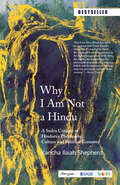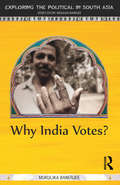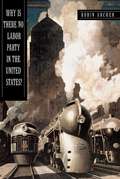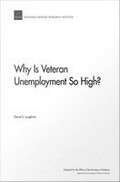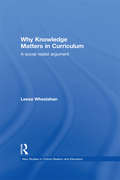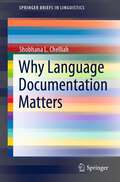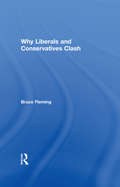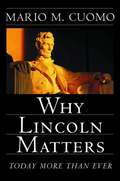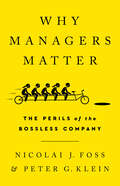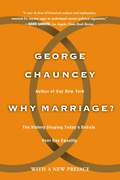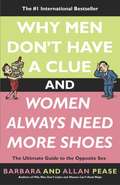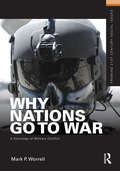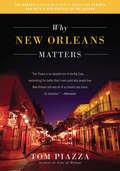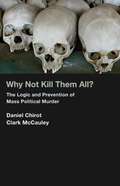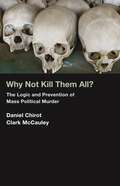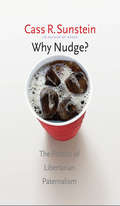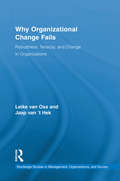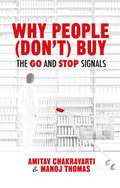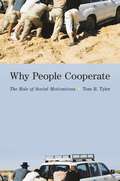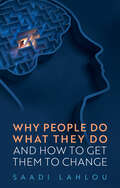- Table View
- List View
Why I Am Not a Hindu: A Sudra Critique of Hindutva Philosophy, Culture and Political Economy
by Kancha Ilaiah Shepherd‘The most gratifying thing for me [is] that [this book] was listed as a millennium book [by The Pioneer] along with Dr. B. R. Ambedkar’s Annihilation of Caste. Moreover, it has been translated into several Indian languages. In a way it has become a weapon in the hands of Dalitbahujan activists’. -from the Afterword to the second edition. Kancha Ilaiah Shepherd writes with passionate anger, laced with sarcasm, on the caste system and Indian society. He looks at the socioeconomic and cultural differences between the Dalitbahujans and Hindus in the contexts of childhood, family life, market relations, power relations, Gods and Goddesses, death and, not the least, Hindutva. Synthesizing many of the ideas of Bahujans, he presents their vision of a more just society. In this second edition, Ilaiah Shepherd presents an Afterword that discusses the history of this book, often seen as the manifesto of the downtrodden Dalitbahujans. He talks of its reviews as well as of the abuse he has received from its detractors. He reminds us of the need for an ongoing dialogue. As he says, he wrote the book ‘for all who have open minds. My request to Brahmin, Baniya and neo-Kshatriyas [upper class Sudras] is this: You learnt only what to teach others—the Dalitbahujans. Now in your own interest and in the interest of this great country, you must learn to listen and to read what we have to say.’
Why India Votes? (Exploring the Political in South Asia)
by Mukulika BanerjeeWhy India Votes? offers a fascinating account of the Indian electorate through a series of comprehensive ethnographic explorations conducted across the country — Delhi, Uttar Pradesh, Bihar, West Bengal, Chhattisgarh, Madhya Pradesh, Tamil Nadu, Kerala, Maharashtra, Gujarat, and Rajasthan. It probes the motivations of ordinary voters, what they think about politicians, the electoral process, democracy and their own role within it. This book will be useful to scholars and students of political science, anthropology and sociology, those in media and politics, and those interested in elections and democracy as also the informed general reader.
Why Inequality Matters
by Shlomi SegallEquality is a key concept in our moral and political vocabulary. There is wide agreement on its instrumental value and its favourable impact on many aspects of society, but less certainty over whether it has a non-instrumental or intrinsic value that can be demonstrated. In this project, Shlomi Segall explores and defends the view that it does. He argues that the value of equality is not reducible to a concern we might have for the worse off, or to ensuring that individuals do not fall into poverty and destitution; instead he claims that undeserved inequalities, wherever and whenever we might find them, are bad in themselves. Assessing the strength of competing accounts, such as sufficientarianism and prioritarianism, he brings together for the first time discussions of the moral value of equality with luck- or responsibility-sensitive accounts of distributive justice. His book will interest readers in political and moral philosophy.
Why Is English Literature?
by Thomas Paul BonfiglioWhy is English synonymous with literature in the United States? Bonfiglio contextualizes the rising hegemony of English within the anti-labor, anti-immigration, xenophobic, mercantile, militarist, and technocratic ideologies that arose in the US in the first half of twentieth century.
Why Is There No Labor Party In The United States? (Princeton Studies In American Politics)
by Robin ArcherWhy is the United States the only advanced capitalist country with no labor party? This question is one of the great enduring puzzles of American political development, and it lies at the heart of a fundamental debate about the nature of American society. Tackling this debate head-on, Robin Archer puts forward a new explanation for why there is no American labor party--an explanation that suggests that much of the conventional wisdom about "American exceptionalism" is untenable. Conventional explanations rely on comparison with Europe. Archer challenges these explanations by comparing the United States with its most similar New World counterpart--Australia. This comparison is particularly revealing, not only because the United States and Australia share many fundamental historical, political, and social characteristics, but also because Australian unions established a labor party in the late nineteenth century, just when American unions, against a common backdrop of industrial defeat and depression, came closest to doing something similar. Archer examines each of the factors that could help explain the American outcome, and his systematic comparison yields unexpected conclusions. He argues that prosperity, democracy, liberalism, and racial hostility often promoted the very changes they are said to have obstructed. And he shows that it was not these characteristics that left the United States without a labor party, but, rather, the powerful impact of repression, religion, and political sectarianism.
Why Is Veteran Unemployment So High?
by David S. LoughranAccording to official statistics, the unemployment rate of young military veterans ages 18-24 reached 29 percent in 2011. This report seeks to put that statistic in perspective by examining the historical time-series of veteran unemployment, comparing the veteran unemployment rate to that of non-veterans, and examining how veteran unemployment varies with time since military separation. Between 2000 and 2011, younger veterans were, on average, 3.4 percentage points more likely to be unemployed than similarly situated younger non-veterans. However, this difference between veteran and non-veteran unemployment falls rapidly with age and time since military separation. The report concludes that the best available evidence supports the hypothesis that relatively high rates of veteran unemployment reflect the fact that veterans, especially younger veterans, are more likely to have recently separated from a job — namely, military service — and, consequently, are more likely to be engaged in job search, which takes time, especially during periods of slow economic growth. The available evidence lends little support to the hypothesis that veterans are inherently disadvantaged in the civilian labor market. Limiting unemployment benefits available to recently separated veterans would likely reduce the length of unemployment spells, but the net effect of such a policy action on the long-term federal budget is unclear. There is very limited evidence on the effectiveness of other federal policies aimed at facilitating the transition of veterans into the civilian labor market.
Why Isn't This Marriage Enough?: How to Make Your Marriage Work and Love the Life You Have
by Sharon PopeThe fifth book in the Soulful Truth Telling series, Why Isn’t This Marriage Enough? is for the woman who has everything she’s ever wanted: the nice husband, the healthy kids, the big home, even the career of her choosing. They have enough money, take family vacations and their kids are in a good school and thriving in their extra-curricular activities. From anyone else’s perspective, her life looks enviable. So why isn’t this enough? She married for safety and security. She married the good guy who wouldn’t hurt her. She plays the role of super-mom, because she can and because she can’t seem to say no to anyone, but her husband. But after long days of caring for everyone else, connecting with her husband in any meaningful way feels like a chore, like he’s one more person that needs something from her. She has love for her husband, the father of her children, but she fears she’s fallen out of love with him. She chose this path, this marriage, this life – so why does she feel so empty and alone? If this isn’t enough, will it ever be enough? What would it take to feel happy? Is that even possible? What kind of miracle is needed for this – all of this – to feel good?Why Isn’t This Marriage Enough guides women to find the answers to that important question and explores whether the marriage can be transformed into a relationship that feels like more than enough.
Why Knowledge Matters in Curriculum: A Social Realist Argument (New Studies in Critical Realism and Education (Routledge Critical Realism))
by Leesa WheelahanWhat should we teach in our schools and vocational education and higher education institutions? Is theoretical knowledge still important? This book argues that providing students with access to knowledge should be the raison d’être of education. Its premise is that access to knowledge is an issue of social justice because society uses it to conduct its debates and controversies. Theoretical knowledge is increasingly marginalised in curriculum in all sectors of education, particularly in competency-based training which is the dominant curriculum model in vocational education in many countries. This book uses competency-based training to explore the negative consequences that arise when knowledge is displaced in curriculum in favour of a focus on workplace relevance. The book takes a unique approach by using the sociology of Basil Bernstein and the philosophy of critical realism as complementary modes of theorising to extend and develop social realist arguments about the role of knowledge in curriculum. Both approaches are increasingly influential in education and the social sciences and the book will be helpful for those seeking an accessible introduction to these complex subjects. Why Knowledge Matters in Curriculum is a key reading for those interested in the sociology of education, curriculum studies, work-based learning, vocational education, higher education, adult and community education, tertiary education policy and lifelong learning more broadly.
Why Language Documentation Matters (SpringerBriefs in Linguistics)
by Shobhana L. ChelliahThis book offers the latest insights on language documentation, a reborn, refashioned, and reenergized subfield of linguistics motivated by the urgent task of creating a record of the world’s fast disappearing languages. Language documentation provides data to challenge and improve existing linguistic theory. In addition, because it requires input from various fields to be comprehensive, language documentation serves to build bridges between linguistics and other disciplines. Language documentation also provides resources for communities interested in language and culture preservation, language maintenance, and language revitalization. This book informs, evokes interest, and encourages involvement at all levels.
Why Liberals and Conservatives Clash: A View from Annapolis
by Bruce FlemingWhy Liberals and Conservatives Clash offers an explanation for the extreme polarization between liberal and conservative that is the hallmark of the American political landscape today. It suggests that liberal thought is intrinsically different from conservative thought, and that each constitutes a self-subsistent world-view with its specific quali
Why Lincoln Matters Today More Than Ever
by Mario Cuomo Harold HolzerBased on how Lincoln would perceive our world today.
Why Living Things Need… Homes (Into Reading Texas, Read Aloud Module 9 #1)
by Daniel NunnNIMAC-sourced textbook
Why Managers Matter: The Perils of the Bossless Company
by Nicolai J Foss Peter G KleinA manifesto on managers and hierarchy that bucks the trend of the lean, flat, leaderless organization As business struggles to adapt to a rapidly changing world, managers are bombarded with a bewildering array of schemes for how to be a boss and make an organization tick. It&’s tempting to be seduced by futurist fantasies where every company has the culture of a startup, and where employees in wacky, whimsical office settings, liberated from hierarchies and bosses that oppress them, are the foundation for breakthrough performance. &“Get real,&” warn Nicolai J. Foss and Peter G. Klein. These fads ironically lead to micromanaging and, often, to disaster. Companies and societies, they show, need authority and hierarchy to coordinate work, including creative work. And, counterintuitively, Foss and Klein illustrate how the creative use of authority and hierarchy helps companies to be more agile and flexible, enabling educated, motivated people and teams to thrive. And not a moment too soon: Foss and Klein provide evidence that global challenges such as the proliferation of artificial intelligence, economic disruption, empowered knowledge workers, and black swan events such as the pandemic actually make hierarchy and the job of the manager more important than ever.
Why Marriage: The History Shaping Today's Debate Over Gay Equality
by George ChaunceyAngry debate over gay marriage has divided the nation as no other issue since the Vietnam War. Why has marriage suddenly emerged as the most explosive issue in the gay struggle for equality? At times it seems to have come out of nowhere-but in fact it has a history. George Chauncey offers an electrifying analysis of the history of the shifting attitudes of heterosexual Americans toward gay people, from the dramatic growth in acceptance to the many campaigns against gay rights that form the background to today's demand for a constitutional amendment. Chauncey illuminates what's at stake for both sides of this contentious debate in this essential book for gay and straight readers alike.
Why Men Don't Have a Clue and Women Always Need More Shoes
by Barbara Pease Allan PeaseAn hilarious and perceptive look at the tactics of men and women from those consummate people-waters, Barbara and Allan Pease. Why are men clueless about romance, love and relationships? Why do they avoid making commitment? Why do men tell lies to women and think they can get away with it? On the other hand, why do women cry to get their own way with men and why do women insist on talking a subject to death? And why do women need more shoes instead of more sex? The gulf between the sexes, the misunderstandings and conflicts are still as present in our lives in the twenty-first century as they were when Adam first fell foul of Eve. Let Allan and Barbara Pease - the internationally renowned experts in human relations, communication and body language - help you transform the way in which you relate to the opposite sex.
Why Muslim Integration Fails in Christian-Heritage Societies
by Claire L. AdidaAmid fears of Islamic extremism, many Europeans ask whether Muslim immigrants can integrate into historically Christian countries. Why Muslim Integration Fails in Christian-Heritage Societies explores this question and concludes that both Muslim and non-Muslim French must share responsibility for the slow progress of integration.
Why Nations Go to War: A Sociology of Military Conflict (Framing 21st Century Social Issues)
by Mark P. WorrellThe United States has been involved in many wars, sometimes for noble causes like defeating Nazism, and, at other times, it has compromised its own ideals, leading to a lot of soul searching and regrets. Some wars are celebrated as glorious achievements (World War II), some are ‘forgotten’ (Korea), and some are ‘ignored’ (Afghanistan). The current wars in the Middle East represent a complex interplay of motivations, challenges, and threats to America’s role as the world’s democratic leadership. In the case of Afghanistan, we find that during the Cold War the US defense and intelligence apparatus directly and indirectly created an incalculable number of radical extremists that have now turned their sights on their former benefactor. The invasion of Iraq represents a different calculus: under the multitude of rationalizations rests a simple political-economic case of a master nation punishing a disobedient subject. In this brief book, America’s relationship with war is explored with an eye toward changes in capitalism from industrialism to post-industrialism, America’s involvement in the Cold War, nuclear proliferation, terrorism, torture, culture, and ideology. The goal of this new, unique Series is to offer readable, teachable "thinking frames" on today’s social problems and social issues by leading scholars, all in short 60 page or shorter formats, and available for view on http://routledge.customgateway.com/routledge-social-issues.html For instructors teaching a wide range of courses in the social sciences, the Routledge Social Issues Collection now offers the best of both worlds: originally written short texts that provide "overviews" to important social issues as well as teachable excerpts from larger works previously published by Routledge and other presses.
Why New Orleans Matters
by Tom PiazzaTom Piazza's award-winning portrait of a city in crisis, with a new preface from the author, ten years after.Ten years ago, in the aftermath of Hurricane Katrina and the disaster that followed, promises were made, forgotten, and renewed. What would become of New Orleans in the years ahead? How would this city and its people recover--and what meaning would its story have, for America and the world?In Why New Orleans Matters, first published only months after the disaster, award-winning author and longtime New Orleans resident Tom Piazza illuminates the storied culture and still-evolving future of this great and vital American metropolis. Piazza evokes the sensuous textures of the city that gave us jazz music, Creole cooking, and a unique style of living; he examines the city's undercurrents of corruption and racism, and explains how its people endure and transcend them. And, perhaps most important, he bears witness to the city's spirit: its grace and beauty, resilience and soul.In the preface to this new edition, Piazza considers how far the city has come in the decade since Katrina, as well as the challenges it still faces--and reminds us that people in threatened communities across America have much to learn from New Orleans' disaster and astonishing recovery.
Why Not Kill Them All? The Logic and Prevention of Mass Political Murder
by Daniel Chirot Clark MccauleyGenocide, mass murder, massacres. The words themselves are chilling, evoking images of the slaughter of countless innocents. What dark impulses lurk in our minds that even today can justify the eradication of thousands and even millions of unarmed human beings caught in the crossfire of political, cultural, or ethnic hostilities? This question lies at the heart of Why Not Kill Them All? Cowritten by historical sociologist Daniel Chirot and psychologist Clark McCauley, the book goes beyond exploring the motives that have provided the psychological underpinnings for genocidal killings. It offers a historical and comparative context that adds up to a causal taxonomy of genocidal events. Rather than suggesting that such horrors are the product of abnormal or criminal minds, the authors emphasize the normality of these horrors: killing by category has occurred on every continent and in every century. But genocide is much less common than the imbalance of power that makes it possible. Throughout history human societies have developed techniques aimed at limiting intergroup violence. Incorporating ethnographic, historical, and current political evidence, this book examines the mechanisms of constraint that human societies have employed to temper partisan passions and reduce carnage. Might an understanding of these mechanisms lead the world of the twenty-first century away from mass murder? Why Not Kill Them All? makes clear that there are no simple solutions, but that progress is most likely to be made through a combination of international pressures, new institutions and laws, and education. If genocide is to become a grisly relic of the past, we must fully comprehend the complex history of violent conflict and the struggle between hatred and tolerance that is waged in the human heart. In a new preface, the authors discuss recent mass violence and reaffirm the importance of education and understanding in the prevention of future genocides.
Why Not Kill Them All?: The Logic and Prevention of Mass Political Murder
by Daniel Chirot Clark McCauleyGenocide, mass murder, massacres. The words themselves are chilling, evoking images of the slaughter of countless innocents. What dark impulses lurk in our minds that even today can justify the eradication of thousands and even millions of unarmed human beings caught in the crossfire of political, cultural, or ethnic hostilities? This question lies at the heart of Why Not Kill Them All? Cowritten by historical sociologist Daniel Chirot and psychologist Clark McCauley, the book goes beyond exploring the motives that have provided the psychological underpinnings for genocidal killings. It offers a historical and comparative context that adds up to a causal taxonomy of genocidal events. Rather than suggesting that such horrors are the product of abnormal or criminal minds, the authors emphasize the normality of these horrors: killing by category has occurred on every continent and in every century. But genocide is much less common than the imbalance of power that makes it possible. Throughout history human societies have developed techniques aimed at limiting intergroup violence. Incorporating ethnographic, historical, and current political evidence, this book examines the mechanisms of constraint that human societies have employed to temper partisan passions and reduce carnage. Might an understanding of these mechanisms lead the world of the twenty-first century away from mass murder? Why Not Kill Them All? makes clear that there are no simple solutions, but that progress is most likely to be made through a combination of international pressures, new institutions and laws, and education. If genocide is to become a grisly relic of the past, we must fully comprehend the complex history of violent conflict and the struggle between hatred and tolerance that is waged in the human heart. In a new preface, the authors discuss recent mass violence and reaffirm the importance of education and understanding in the prevention of future genocides.
Why Nudge?
by Cass R. SunsteinBased on a series of pathbreaking lectures given at Yale University in 2012, this powerful, thought-provoking work by national best-selling author Cass R. Sunstein combines legal theory with behavioral economics to make a fresh argument about the legitimate scope of government, bearing on obesity, smoking, distracted driving, health care, food safety, and other highly volatile, high-profile public issues. Behavioral economists have established that people often make decisions that run counter to their best interests#151;producing what Sunstein describes as #147;behavioral market failures. ” Sometimes we disregard the long term; sometimes we are unrealistically optimistic; sometimes we do not see what is in front of us. With this evidence in mind, Sunstein argues for a new form of paternalism, one that protects people against serious errors but also recognizes the risk of government overreaching and usually preserves freedom of choice. Against those who reject paternalism of any kind, Sunstein shows that #147;choice architecture”#151;government-imposed structures that affect our choices#151;is inevitable, and hence that a form of paternalism cannot be avoided. He urges that there are profoundly moral reasons to ensure that choice architecture is helpful rather than harmful#151;and that it makes people’s lives better and longer.
Why Organizational Change Fails: Robustness, Tenacity, and Change in Organizations (Routledge Studies in Management, Organizations and Society)
by Leike van Oss Jaap van 't HekChange in organizations can arise spontaneously, or it can begin in response to a planned process of change. Even planned change is not as predictable as one might like it to be; it is often partial or incomplete, or the results of change may not be what one hoped. The aspects of an organization that resist change can be vital to an organization’s success, helping to keep it firm, stable, and robust. Why Organizational Change Fails aims to make change managers and OD consultants sensitive to signals of the robust part of an organization, helping them to see something different than they usually see: signs of change. The authors distinguish two aspects of stability in organisations: robustness and tenacity. Robustness is the ability of organisations to remain stable under changing conditions. Tenacity is the reaction of a robust system to planned change. Each of these aspects has its own unique qualities and value within organizations. In the book, the authors describe three aspects of robustness: social, cognitive and political. They also describe healthy and unhealthy forms. Tenacity is described in three patterns: bouncing back, smothering and calculating. Each chapter of the book is preceded by an essay written by a leading scientist designed to help provide real-world context for the process of change and offering insights for the reader on either side of the change equation.
Why People (Don’t) BUY
by Amitav Chakravarti Manoj ThomasFull of practical diagrams and maps, as well as international case studies, this book offers a unique and extensively-tested 'GO-STOP Signal Framework', which allows managers to better understand why consumers are not buying their products and what can be done to put this right.
Why People Cooperate: The Role of Social Motivations
by Tom R. TylerAny organization's success depends upon the voluntary cooperation of its members. But what motivates people to cooperate? In Why People Cooperate, Tom Tyler challenges the decades-old notion that individuals within groups are primarily motivated by their self-interest. Instead, he demonstrates that human behaviors are influenced by shared attitudes, values, and identities that reflect social connections rather than material interests. Tyler examines employee cooperation in work organizations, resident cooperation with legal authorities responsible for social order in neighborhoods, and citizen cooperation with governmental authorities in political communities. He demonstrates that the main factors for achieving cooperation are socially driven, rather than instrumentally based on incentives or sanctions. Because of this, social motivations are critical when authorities attempt to secure voluntary cooperation from group members. Tyler also explains that two related aspects of group practices--the use of fair procedures when exercising authority and the belief by group members that authorities are benevolent and sincere--are crucial to the development of the attitudes, values, and identities that underlie cooperation. With widespread implications for the management of organizations, community regulation, and governance, Why People Cooperate illustrates the vital role that voluntary cooperation plays in the long-standing viability of groups.
Why People Do What They Do: And How to Get Them to Change
by Saadi LahlouWhy do people behave in the way they do and how can we get them to change? Drawing on a large body of empirical research, Lahlou shows that people’s behaviour is predictable and shaped by ‘installations’ combining three sets of factors: what is technically possible (affordances of the environment), what people are able to do (embodied competences), and what monitors and controls behaviour (social regulation). These channel our behaviour and incline us to act one way or another in specific circumstances – in the way, for example, that when you travel by plane, the steps you take from the moment you check in to the moment you take your seat are fixed and predictable. Lahlou shows how we can intervene at each of the three levels of installations to change human behaviour, and how we can combine them for greater effectiveness and direction, with a robust, step-by-step method. Because the method is so powerful, Lahlou also provides ethical guidelines and caveats about using these interventions to improve society, not just one's own business and interests. This concise and authoritative book, packed with real-world examples, will be of interest to anyone concerned about how to tackle the difficult problems of today’s world. At long last, a book that offers realistic, concrete steps for changing our ways.
